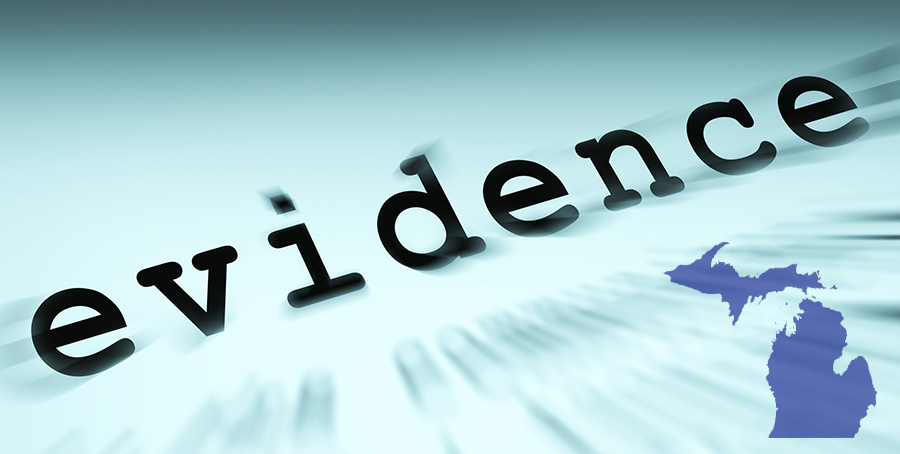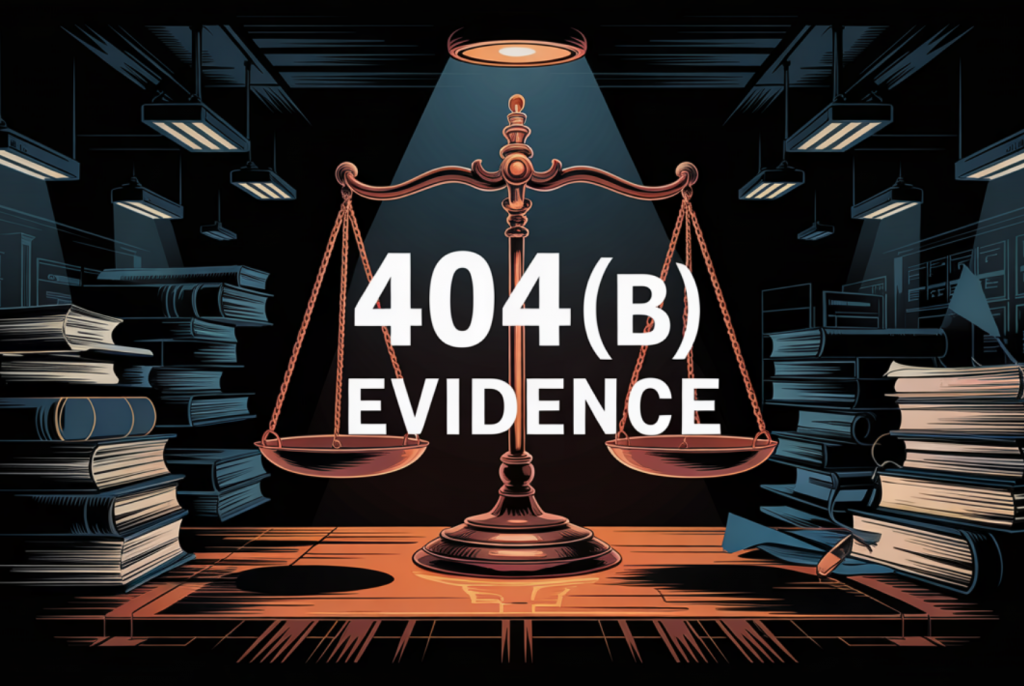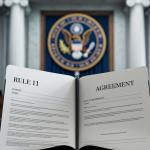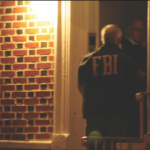Other Bad Acts Evidence
The general trend in Michigan courts and the legislature is to make crimes easier for the prosecutor to prove, increase evidence, and facilitate the introduction of evidence for the government.

Michigan 404(b) – Other Bad Acts Evidence
One of the most troubling types of evidence for defendants seeking a just and fair outcome is evidence of “other crimes, wrongs, and acts,” also known as “other bad acts evidence.”
Under Michigan Rule of Evidence 404(b), the prosecutor may introduce other bad acts as evidence of totally unrelated acts and prior crimes if there is a legitimate reason and the evidence is relevant. The only purpose for which the prosecution cannot introduce this type of evidence is if the sole purpose is to show the defendant’s propensity to commit crimes. In other words, if the prosecutor introduces the evidence to show motive, intent, lack of mistake, scheme, or system in doing an act, the evidence would likely be admissible.
Disreputable Prosecutors Play Fast and Loose with Other Bad Acts Evidence Rules
Although the other bad acts evidence rule has always required that the prosecutor provide advance notice to the defense if it intends to introduce “other acts evidence,” prosecutors have played fast and loose with the notice requirement. The defendant’s lawyer would often get a notice during the trial when there is no time to prepare or investigate the other bad acts evidence the prosecutor intends to use.
The Michigan Supreme Court has amended the rule and now makes the notice requirement a bit more meaningful. The prosecutor can give notice during the trial; however, the burden for an exception to the notice requirement is a bit higher. The significant changes are that instead of “reasonable notice at least 14 days before trial”, the rule now requires that the notice be “written” or “oral on the record” (this means in open court and front of the judge). The words allowing for the notice to be “during the trial” have been deleted; however, the rule does not prevent the notice from being provided during the trial.

The Danger of Other Bad Acts Evidence
Michigan Rule of Evidence 404(b) allows prosecutors to bring up a person’s past mistakes in court. Even if those prior acts never led to charges or a conviction, the prosecution can ask the judge to allow them as evidence. They claim it helps show things like motive, intent, or identity, not that the person has a bad character. But in reality, jurors often see it as proof that the defendant must be guilty this time, too.
Introducing evidence of the defendant’s prior transgressions creates a real danger. Once jurors hear about something bad from the past, it becomes harder for them to focus on the evidence in front of them. They may start to believe the defendant acted “just like before,” even if the facts don’t support that conclusion. That’s not justice.
The rules say prosecutors can’t use prior bad acts to show someone has a criminal nature. But in practice, that line often blurs. Without strong legal protection, jurors may judge a person based on who they used to be—or who the prosecution claims they were—rather than the facts of the case.
How to Stop the Prosecution from Introducing Evidence of Past Mistakes
Keeping damaging 404(b) evidence out of a trial takes more than filing a simple motion. The process is technical, time-sensitive, and often uphill. Prosecutors usually claim they need this evidence to show motive, intent, or identity, and many judges lean toward allowing it, especially if the prior acts appear similar to the current charges.
Judges often believe that if the jury hears everything, they can sort out what’s fair. But that’s not how it works. Once jurors hear about a defendant’s past, they may assume guilt before they even review the actual evidence. That assumption can derail a fair trial.
The lawyers at LEWIS & DICKSTEIN, P.L.L.C. know how to challenge these tactics. We don’t let the prosecution define the narrative. We anticipate their arguments, attack their logic, and expose the risk of unfair prejudice. We show judges why the law requires exclusion, not just because it’s legally improper, but because it’s fundamentally unfair.
Suppressing this type of evidence is not a fight for inexperienced or passive lawyers. It takes deep knowledge of the rules of evidence, sharp courtroom instincts, and a relentless drive to protect the client. We bring all of that—and more—to every hearing, every motion, and every trial. Our team successfully excludes prejudicial other bad acts evidence on a regular basis because we know how to argue forcefully and effectively.

Experienced Misdemeanor Representation in Federal or State Court
If you are charged with a criminal offense, you need the best representation possible to protect you in court and give you the best defense possible. With weak criminal defense representation, the government will walk all over you in court and, potentially, obtain a wrongful conviction. Our skilled and aggressive defense lawyers never stand for the mistreatment of our clients, and we do not back down from any fight! For felony or misdemeanor representation in federal or state court, call LEWIS & DICKSTEIN, P.L.L.C. We will find a way to help you.
Call us today at (248) 263-6800 for a free consultation or complete an online Request for Assistance Form. We will contact you promptly and find a way to help you.
We will find a way to help you.
We Are Not Afraid to Win!
The text of the new order is as follows:
October 11, 2017 Amendment of Rule 404 of the Michigan Rules of Evidence
On order of the Court:
Rule 404 Character Evidence Not Admissible to Prove Conduct; Exceptions; Other Crimes
(a) (Unchanged.)
(b) Other crimes, wrongs, or acts.
(1) (Unchanged.)
(2) The prosecution in a criminal case shall provide written notice at least 14 days in advance of trial, or orally on the record later if the court excuses pretrial notice on good cause shown, of the general nature of any such evidence it intends to introduce at trial and the rationale, whether or not mentioned in subparagraph (b)(1), for admitting the evidence. If necessary to a determination of the admissibility of the evidence under this rule, the defendant shall be required to state the theory or theories of defense, limited only by the defendant’s privilege against self-incrimination.














